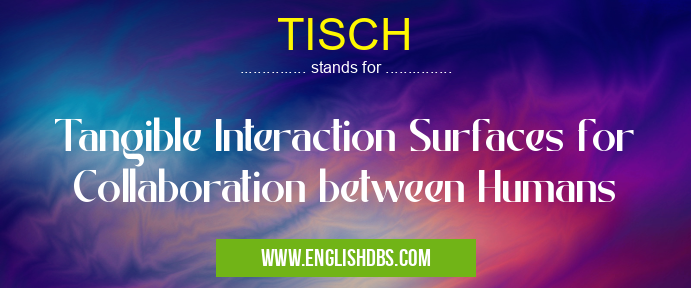What does TISCH mean in RESEARCH
TISCH stands for Tangible Interaction Surfaces for Collaboration between Humans. TISCH is the ultimate tool for multidisciplinary collaborative work in a physical space. It is a cutting-edge technology being used to facilitate collaboration between people in different areas of expertise, from design to engineering, from healthcare to education. It enables teams to work collaboratively on tangible surfaces that intrinsically recognize hand and body gestures as well as digital content movement. With this technology, teams can easily share data, documents, images, and videos without having to use multiple devices. Through the use of interactive surfaces that are both tactile and intuitive, users can interact with each other in real time while working together in physical spaces. This allows teams to make quick decisions regarding projects and find creative solutions more efficiently than ever before.

TISCH meaning in Research in Academic & Science
TISCH mostly used in an acronym Research in Category Academic & Science that means Tangible Interaction Surfaces for Collaboration between Humans
Shorthand: TISCH,
Full Form: Tangible Interaction Surfaces for Collaboration between Humans
For more information of "Tangible Interaction Surfaces for Collaboration between Humans", see the section below.
Meaning
TISCH is an advanced way for people from different disciplines such as design and engineering to collaborate together in physical spaces using interactive surfaces that recognize hand and body gestures as well as digital content movements. This system allows users to quickly share information within a team setting making it easier for members to come up with creative solutions more quickly and efficiently than before.
Advantage
The main advantage of implementing TISCH into workplaces is the ability for teams to communicate quickly in order to make informed decisions about projects almost instantaneously without having to resort to passing back and forth physical documents or manually transferring digital data between computers or devices. Additionally, since users have a variety of options when it comes to how they want their surface setup—touch control, voice commands or motion sensing—the system makes collaboration across disparate departments easier than ever before, allowing them all to contribute their ideas simultaneously which eventually leads to better results overall.
Essential Questions and Answers on Tangible Interaction Surfaces for Collaboration between Humans in "SCIENCE»RESEARCH"
What is TISCH?
TISCH stands for Tangible Interaction Surfaces for Collaboration between Humans. It's a research project that focuses on developing novel tangible user interfaces that enable collaborative tasks among people.
How does TISCH work?
The idea behind the project is to develop interactive surfaces, such as tables, walls or floors, that sense physical objects placed on them and allow people to use them as interaction interfaces for various tasks. The project uses a combination of sensor technologies and software algorithms to enable users to interact with the surfaces in a natural manner.
What are the benefits of using TISCH technology?
The main benefit of this technology is its ability to foster better collaboration between people by providing an intuitive and natural way of interacting with computers and other individuals. The tangible user interfaces created through TISCH also have potential applications in areas such as education or healthcare.
Is TISCH limited only to tables?
No, TISCH is not limited to tables alone. The project can be used to develop interactive surfaces on different materials like walls or floors, in addition to traditional tabletops.
What types of objects can be used with the system?
Objects that can interact with the surface include any objects that contain RFID tags or are equipped with Bluetooth Low Energy (BLE) chips. These objects can then be detected by sensors embedded inside the surface and can be used as input devices for the system.
Are there any limitations when using TISCH technology?
One limitation of the system is its current range – it is currently designed for local interactions among people who are located in close proximity to one another. Nevertheless, it has potential applications beyond these bounds with future research exploring remote collaborations scenarios through additional technologies.
Does TISCH require special hardware components?
Yes, in order for the system to work correctly specialized hardware components such as sensors or RFID tags need to be installed into the interactive surfaces beforehand.
Is it possible for multiple users interact at once with one table?
Yes, multiple users can interact with a single table simultaneously depending on how many sensors have been installed onto it.
Can I customize how my tabletop looks like after installing TISCH?
Yes, customizations regarding colors and textures of your tabletop are possible after installing the system.
Is there a fee associated with using this technology?
No, at present there are no fees associated with using this technology since it’s still under development.
Final Words:
Overall, TISCH has revolutionized the way teams collaborate in workplace settings by giving employees at different levels more freedom when it comes to meetings by providing a single platform that everyone can collaborate on at the same time with minimal effort required from all parties involved. The advantages offered by this technology are immense, decreasing both time spent trying to organize meetings as well as increasing efficiency when handling projects.
